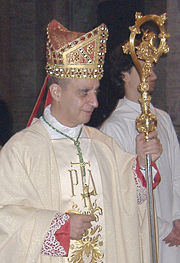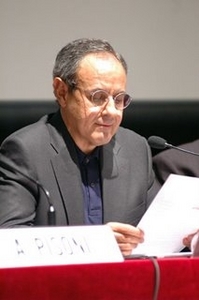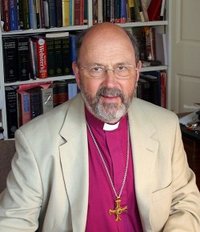The Right Rev’d Nicholas Thomas (NT) Wright, 61, Anglican bishop of the Diocese of Durham, announced his retirement effective on August 31, 2010. Wright has been the Lord Bishop of Durham since 2003. He’s an Oxford educated scholar of the New Testament. He’ll be taking a professorial position at the University of Saint Andrews, Scotland.
Tag: NT Wright
Some interesting interventions at the Synod
Most Rev. Paolo Pezzi, F.S.C.B., Archbishop of Mother of God in Moscow
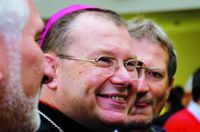 In this historical moment, the Word of God cannot be separated from the event of Jesus Christ
In this historical moment, the Word of God cannot be separated from the event of Jesus Christ
In present relativism, which leans to level off any differences, so that all words are valid and none is more valid than the other, where all is reduced to a game of opinions, the Biblical word must incarnate itself in the beauty of its witnesses, if it wants to draw the world towards the truth. In Instrumentum Laboris (48), it is cleverly pointed out that “Making the Word of God and the Sacred Scriptures the soul of his pastoral activity, the bishop is capable of bringing the faithful to encounter Christ” […] “so that, through their own experience, the faithful will see that the words of Jesus are spirit and life (cf. Jn 6:63) […]”.
The announcement of the Word of God, should therefore have as its scope making persons, so to speak, that they are in the presence of the living Person: be witnesses of the Person of Jesus Christ, the Logos became flesh. Or according to Saint Paul’s splendid words: it should be “a clear picture of Jesus Christ crucified, right in front of your eyes“. The Word of God is a source of an evermore deep and authentic knowledge of Christ, of “the knowledge of God’s glory, the glory on the face of Christ” (2 Cor 4:6). Such glory of Christ kindles a fire in us, becomes a desire to witness Him. It is said in Instrumentum Laboris (54) that “listening to the Word of God is a priority for our ecumenical commitment”. It is necessary to renew among Christians the tension towards the person of Christ Himself, the desire to understand and know more deeply His mystery. Through the encounter with the Word made flesh, made possible by the Spirit, we rediscover communion with Him: it is the force of the Spirit of the Risen Christ that attracts the scattered people towards His only body.
Most Rev. Salvatore Fisichella, President of the Pontifical Academy for Life; Rector of the Pontifical Lateran University
The Dei Verbum had still not been discovered and developed in its great intuition that constituted an authentic dogmatic progress; the Council fathers in fact had recovered the Biblical concept of the uniqueness of the source. This allowed Sacred Scripture to be understood within the life of the Church which does not just live by it but is responsible for its being alive, complete and fruitful. Many believers when asked what they mean by “Word of God” reply: the Bible. This is not a wrong answer, but it is incomplete or at least it shows an incomplete perception of the richness present in the expression and leads, as a consequence, to identifying Christianity as the “religion of the book”. It is necessary that in our language we do not fall into the uncertain expression “the three religions of the book”. Christianity is the religion of the “word”. It is important to strive for the construction of a culture that sees sacred Scripture as a living word, dynamically open to the truth of the revelation it contains. If we do not present this teaching in its totality in the various instruments we possess for the training of our people, we risk humiliating the Word of God because we reduce it exclusively to a written text without the provocative force to bring meaning to life any longer. As the Apostle reminds us: “God’s message cannot be chained up” (2 Tm 2:9).
What we are always faced with is the inexhaustibility of the Word of God; it is like the bush that burns without going out. We are called to exercise a ministry that permits this Word of Life to spread so that everyone in every part of the world can grasp its profound meaning in such a way as to obtain salvation. In a time like ours filled with attempts to marginalize the sacred texts as bearers of meaning only insofar as they are myths, with no historical character and destined only for the naïve, it is important that they find the necessary forms to restore historical value and provocativeness about the sense of existence. We really are faced with a teaching emergency that brings back to the center of our life of faith the theme of salvation. Again Dei Verbum reminds us how much has been transmitted and written on the “salvation announcement” (DV 7). The various cultural tendencies present in the modern world have not only perverted the meaning of salvation but they have marginalized it as useless and illusionary. Representing the Word of God in its totality means pointing the scope of its teaching towards the theme of our salvation.
Father Father Julián Carrón, President of the Fraternity of Communion and Liberation
The Church’s recent Magisterium offers us some elements for avoiding any possible reduction regarding this difficulty.
It was the Second Vatican Council’s merit to have recuperated a concept of revelation as the event of God in history. In fact, Dei Verbum allows us to understand revelation as the event of the self-communication of the Trinity in the Son, both the mediator and the fullness of all revelation,” in whom “the deepest truth about God and the salvation of man shines out,” (DV2) through the Holy Spirit in human history. It is Christ who “perfected revelation by fulfilling it through his whole work of making Himself present and manifesting Himself: through His words and deeds, His signs and wonders, but especially through His death and glorious resurrection from the dead and final sending of the Spirit of truth.” (DV 4).
The encyclical Deus Caritas Est quite rightly recalls that “Being Christian is not the result of an ethical choice or a lofty idea, but the encounter with an event, a person, which gives life a new horizon and a decisive direction. (DCE 1¸cf. FR 7)
This event does not belong only to the past, to one moment of time and space, but remains present in history, communicating itself through the whole life of the Church that welcomes it. For “Christ’s relevance for people of all times is shown forth in his body, which is the Church. (VS 25 cf. FR 11). As the Apostles transmitted “what they had received from the lips of Christ, from living with Him, and from what He did” (DV 7), so the Church “in her teaching, life and worship, perpetuates and hands on to all generations all that she herself is, all that she believes” (DV 8). Precisely because of this character of event proper to revelation and to its transmission, the Conciliar Constitution stresses that though “expressed in a special way in the inspired books” (cf. DV 8), the event of revelation does not coincide with Holy Scripture. The word of the Bible witnesses Revelation, but does not contain it in such a way as to be able to exhaust it in itself. For this reason, “it is not from Sacred Scripture alone that the Church draws her certainty about everything which has been revealed” (DV 9).
If revelation has the character of an historical event, when it comes into contact with man it cannot fail to strike him, provoking his reason and his freedom. The Gospel narratives in their simplicity show this, witnessing to the wonder that Jesus’ person aroused in those who met Him (Cf. Mk 1:27; 2:12; Lk 5:9) Jesus’ presence widens our vision so we can see and recognize what is before us (Cf. Lk 24, Emmaus). The encyclical Fides et Ratio insists on this when it affirms that men “can make no claim upon this truth [of revelation], which comes to them as gift and which, set within the context of interpersonal communication, urges reason to be open to it and to embrace its profound meaning” (FR 13).
So the encyclical characterizes the impact that revealed truth provokes in man who encounters it with a twofold impulse: a) it widens reason so as to make it adequate to the object; b) it facilitates the acceptance of its deep meaning. Instead of mortifying man’s reason and freedom, revelation enables both to grow to the fullness of their original condition.
Relationship with the tradition living in the Church’s body enables each and every man to share in the experience of those who encountered Jesus. Astounded by His unique exceptionality, these began a journey that enabled them to reach certainty about his absolute claim, that of being God. Those who make this journey do not accept naively the tradition they meet, but on the contrary put it to the proof, thus enabling their reason to grasp its truth.
The experience of encounter with Christ present in the Church’s living tradition is an event and becomes, therefore, the determining factor in the interpretation of the biblical text. It is the only way to enter into harmony with the experience witnessed by the text of Scripture, for “correct knowledge of the biblical text is accessible only to those who have a lived affinity with what the text speaks of” (PCB 70). I was able to document this hermeneutical principle in a simple but meaningful episode that occurred some years ago in Madrid. There was a young man who had had no contact with Christianity; when he met a living Christian community he began to participate and to attend Holy Mass. After the first occasions of hearing the Gospel, he commented: “What happened to us happened to them!” It was the ecclesial present that disclosed the meaning of the Gospel account.
In synthesis, “[The apostles’] capacity to believe was completely sustained and activated by the revealing person of Jesus,” according to the fine expression of [Cardinal] Hans Urs von Balthasar, enabled them to grasp the mystery of His person and adhere to Him. Analogically, today our reason needs the Event present in the tradition of living witnesses so as to open up to the Mystery of Christ, who comes towards us in them. But we will be able to recognize the unmistakable features of Jesus Christ only if we are familiar with the unique, canonical witness of His absolutely original features offered by the Sacred Scriptures. St. Augustine summarized it well: “In manibus nostris sunt codices, in oculis nostris facta.”
Cardinal Daniel N. DiNardo, Archbishop of Galveston-Houston
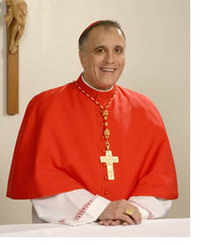 The Eternal Word emptied himself for our salvation. In an analogous way the Holy Spirit has also given and “humbled” himself in the inspiration of the Holy Scriptures. With great courtesy he has adapted the divine “language” with thought towards our human nature (Dei Verbum
The Eternal Word emptied himself for our salvation. In an analogous way the Holy Spirit has also given and “humbled” himself in the inspiration of the Holy Scriptures. With great courtesy he has adapted the divine “language” with thought towards our human nature (Dei Verbum
I speak in behalf of Catholics who live in the famous Bible Belt of the Southern United States. It is a genuine location, but it is also a frame of mind, diffused through many places in the world. There are surely issues and problems with this mind set, but it has kept alive a Biblical imagination and vocabulary and a sense of divine agency in the world that is important for us. In the Instrumentum Laboris, #18 a-g and 22 c-d, the Word of God is spoken about in a deeply rich christological way. The pneumatology, however, is more discrete. Catholics in the Bible Belt need a pneumatology that can help them in reading Scripture.
I would recommend the publication of a Compendium, similar to other such documents, that would be directed to the faithful. It would be a clear and direct guide that would highlight the rich and useful methods of the Church for reading and sharing the Sacred Scriptures. Such a Compendium would be an immeasurable help for personal bible reading, for Bible Study groups etc. Totally ecclesial and Catholic, it would also be of great help in ecumenical bible studies in which many of our people are enrolled. It would help retrieve a vivid and excellent sense of the Catholic understanding of the Holy Spirit’s inspiration in the Sacred Scriptures.
Right Rev. Nicholas Thomas Wright, Bishop of Durham, Anglican Church
1. We face the same challenges as you: not only secularism and relativism, but also postmodernity. Uncertainty here breeds anxiety: (a) the Bible might tell us unwelcome things; (b) its message might be stifled.
2. A fourfold reading of scripture as the love of God: heart (Lectio Divina, liturgical reading); mind (historical/critical study); soul (church life, tradition, teaching) and strength (mission, kingdom of God). These must be balanced.
3. In particular, we need fresh mission-oriented engagement with our own culture. Paragraph 57 of the Instrumentum Laboris implies that Paul’s engagement merely purifies and elevates what is there in the culture. But Paul also confronts pagan idolatry, and so must we. In particular, we must engage critically with the tools and methods of historical/critical scholarship themselves.
4. The climax of the Canon is Jesus Christ, especially his cross and resurrection. These events are not only salvific. They provide a hermeneutical principle, related to the Jewish tradition of ‘critique from within’.
5. Mary as model: Fiat (mind); Magnificat (strength); Conservabat (heart) – but also Stabat, waiting patiently in the soul, the tradition and expectation of the church, for the new, unexpected and perhaps unwelcome, but yet saving, revelation.
